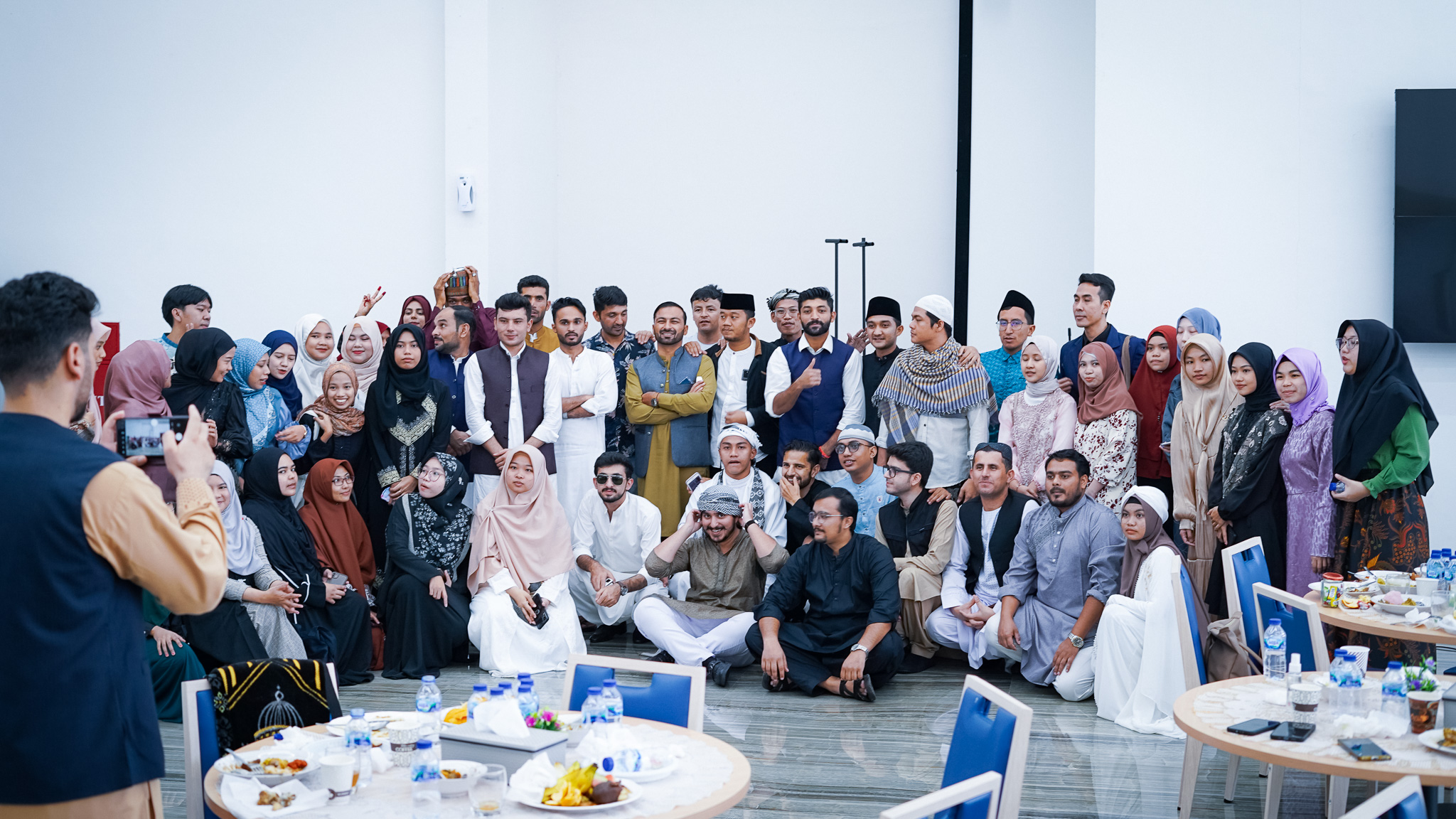Eid at UIII
April 17, 2024Contributor: Achmad Jatnika

UIII, Depok - The sound of takbir resounded from a mosque in an area of 142 hectares in Depok. The mosque has succeeded in becoming a melting pot, an intersection of cultures and traditions from all over the world through its student community.
The mosque is Rahmatan lil Alamin. During the 30 days of Ramadan 1445 Hijriah, this mosque was crowded every day to became a space for students and people who just wanted to break their fast or worship afterward.
Exactly on Wednesday, April 10, 2024, the government set the day as 1 Shawwal so that the celebration of Eid al-Fitr falls on that day. This day is a day of victory for Muslims, especially in Indonesia, which has a robust Eid al-Fitr culture.
On this blessed day, Indonesian and international students gathered at the Ramhatan Lil Alamin Mosque to perform Eid prayers on campus. Students who cannot go home to meet and celebrate with their families gather (at Rahmatan Lil Alamin) to celebrate Eid al-Fitr with students, staff, and lecturers on campus.
UIII are served ketupat, rendang, vegetables, chicken opor, meat stew, and fruits, which are special foods during Eid al-Fitr in every house. This moment depicts a festive Eid atmosphere and introduces special Eid foods to international students who celebrate Eid al-Fitr on campus.
Vee, an MA in Islamic Studies student, tells us that UIII helped her during Eid this year. She cannot return to her hometown and meet her family, but she feels the atmosphere at the campus. Vee is from Aceh and feels glad to spend Eid with her friends who cannot return to their hometown.
She’s happy that UIII facilitated some activities, such as Eid gatherings, so students don’t feel sad when they’re far from their families during Eid. “Eid on campus cures sadness because you have to be away from your family. It's nice to experience Eid on campus because many friends don't go home, and the campus also facilitates various services and activities for students, such as the Eid Gathering,” she said.
Even though there are some differences between her home Eid traditions, she feels happy that she can have an opportunity to experience Eid with a diverse vibe and to exchange stories about Eid traditions in each country; this Eid has been an extraordinary experience for her.
Besides Vee, Nasrullah, an MA in Education student, feels the same. He can’t return to his hometown in Pinrang, South Sulawesi, because his parents are in Kalimantan for Eid. He decided to pray and celebrated Eid in UIII. He still felt the Eid moment, even without his family around, but he still rounded with his colleagues, lecture, and all the civitas academic of UIII. “That moment was very memorable for me,” he said.
One thing he really misses is his favorite local food from Sulawesi, Burasas —an Indonesian rice dumpling cooked with coconut milk packed inside a banana leaf pouch. It is similar to lontong but has a richer flavor that is acquired from coconut milk. “The food is not lacking (at Eid) because I think it is delicious and still tastes Indonesian. But I miss my local food,” said Nasrullah.
Current Eid al-Fitr is the third time UIII celebrated on campus since its establishment. Hopefully, when the campus gets larger —its infrastructure and people— it will create a new culture and tradition. The students from all over the world and the local students from all over Indonesia will bring their traditions, and everyone will experience Eid traditions from all over the world on one campus.
- UIII Extends Application Deadline for 2025 International Admissions
- What Does Eid al-Fitr Mean for the UIII Academic Community?
- UIII PhD Scholar Ararat Kostanian Delivers Lecture at Armenia's Yerevan State University
- Swedish Ambassador to Indonesia Applauds UIII’s Vision, Explores Future Collaboration
- Depok Mayor Supports UIII as the Green Lung of Depok and Beyond
- Depok Mayor Pledges to Build Performance Hall at UIII
- New Parking Facility Launched, Part of UIII-Sentra Medika Hospital Partnership
- Yogyakarta’s UII Won 1st FisFastFest’s Clash of Campuses
- Vice Minister of Religious Affairs Praises UIII as a Global Hub for Islamic Education
- Hurray!! UIII Wins Football Championship